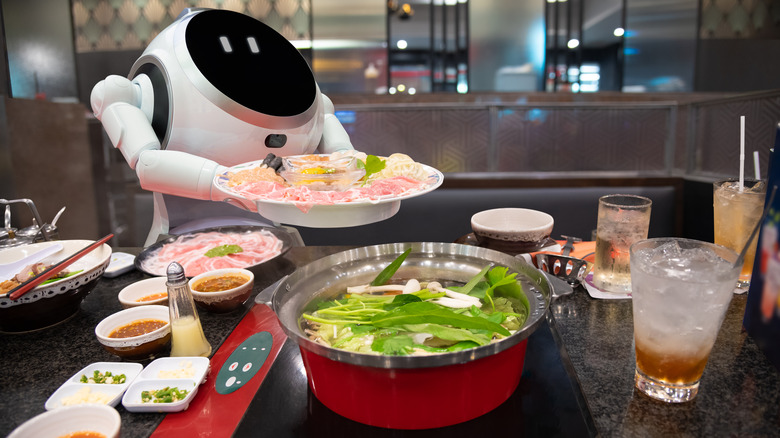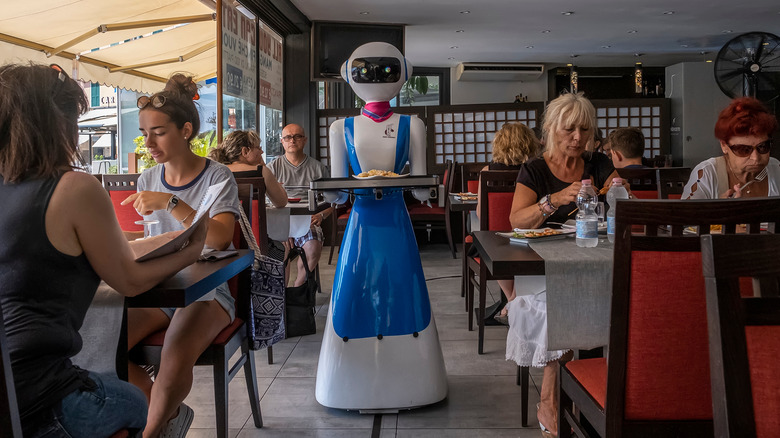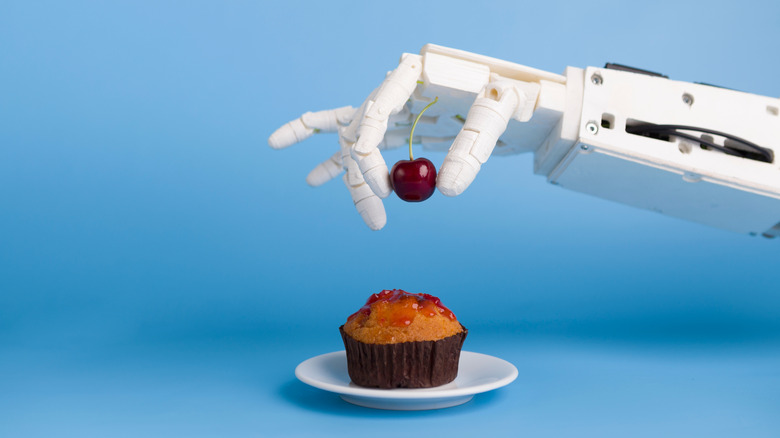The Real Reason Cambridge Scientists Invented A Robot To Chew Food
The future of food preparation could lie in the mechanical hands of robots, thanks to recent developments in artificial tasting technology. According to The Guardian, robotics engineers at Cambridge University have developed and trained a sophisticated robot chef that is capable of mimicking human taste buds in order to accurately taste test food throughout the cooking process.
In a video posted to the Cambridge University YouTube channel, the robot is shown "tasting" a plate of scrambled eggs and tomatoes repeatedly in order to determine the overall salinity and flavor of the dish. Throughout the video, the plate of eggs is slowly pulverized into a pulp, replicating the human chewing process.
The Cambridge researchers responsible for the robot trained the mechanical chef to measure both the saltiness and overall taste of a plate of food at different stages in the "chewing" process in order to properly reflect the human dining experience. According to the researchers, as human beings chew a bite of food, the perception of the taste changes as saliva is produced and digestive enzymes come into play.
Grzegorz Sochacki, one of the researchers working on the culinary robot, explained the reasoning behind this invention. "If robots are to be used for certain aspects of food preparation, it's important that they are able to 'taste' what they're cooking," Sochacki stated. The robot chef, which was initially trained to prepare and taste omelets, is learning to determine whether or not a dish is properly seasoned one bite of eggs at a time.
Researchers predict robots could eventually tailor foods to individual taste preferences
The Cambridge researchers hope to eventually expand upon the technology in order to create customizable robot cooks that will be capable of adjusting various elements of a cooked dish — from the seasoning to the level of sweetness to the quantity of oil — to fit individual preferences (via The Guardian).
"This [technology] is a leap forward in robotic cooking, and by using machine- and deep-learning algorithms, mastication will help robot chefs adjust taste for different dishes and users," said Dr. Muhammed Chughtai, a scientist who worked with the Cambridge research team on the project. Chughtai noted that while the technology still has a ways to go, food robots have the potential to play a major role in both restaurant and home kitchens.
Fast Casual reports robots have already begun to take on a more prominent role in the food industry, offering a high-tech solution to various issues. Service-focussed robotics developers have created robots capable of shaking cocktails, assembling salads, making pizzas, operating full-service coffee shops, and more. These new developments in robotics technology have led to increasing amounts of restaurateurs turning to non-human workers in the face of recent labor and health issues that impacted culinary operations around the world (via CNBC).
Increasing numbers of restaurateurs have invested in service robots
Earlier this year, the fast food burger chain White Castle made headlines after announcing in a press release it would be installing a robot chef nicknamed "Flippy" (named after its primary task of flipping burgers) in 100 restaurant locations across the U.S. The makers of Flippy noted that in addition to providing an extra hand — or rather, robotic spatula arm — in the kitchen, the robot also helps prevent the spread of food-borne pathogens by limiting human exposure to food (via CNN).
In a similar effort to reduce the potential spread of germs through food, Inside Edition shared dining halls at this year's Olympic Games (which were held in Beijing, China) utilized robot chefs and servers to help curb the potential spread of COVID-19.
Although robots have proven themselves to be helpful tools in various areas of the kitchen, one thing the machines haven't been able to properly mimic is a human's tasting capabilities — until now. While Cambridge researchers hope that a robot capable of accurately replicating a human tasting experience is on the horizon, per The Guardian, the ultimate robotics-related question remains: What are the potential moral and societal implications of replacing human chefs with super-tasting machines?


